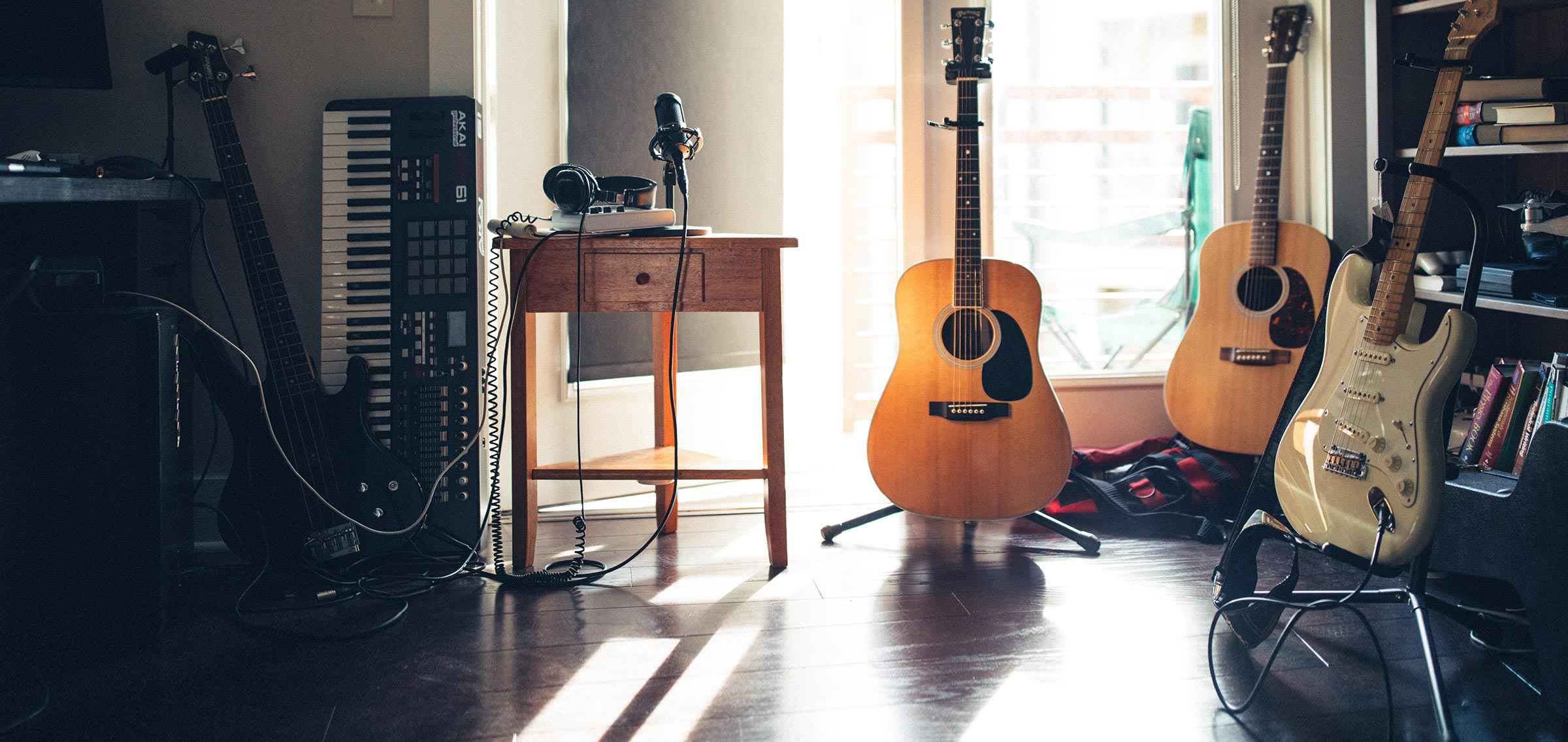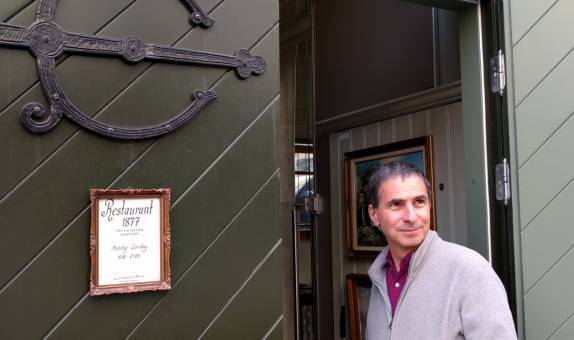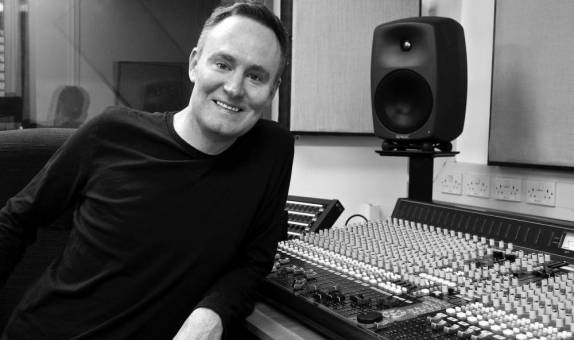Composing for Film and Television MMus
Why choose this course?
This course explores how music creates atmosphere, conveys mood and depicts setting, character and action.
You will examine the relationships between composer and producer, directors and music editors. You will study the technology used to produce high-quality soundtracks as well as business and copyright issues. Through optional modules, you will be able to tailor the course to your interests.
For your major project, you will create a portfolio of music to picture and work with filmmakers. There are opportunities to collaborate with film-making and animation students.
| Mode | Duration | Start date |
|---|---|---|
| Full time | 1 year |
September 2024 September 2025 |
| Part time | 2 years |
September 2024 September 2025 |
| Main Location | Kingston Hill |
Reasons to choose Kingston
- You will learn techniques for composing and producing music for different media, be taught by professional composers, and collaborate with filmmakers and animators.
- There is the opportunity to have your compositions performed by an ensemble, conducted to picture in a professional recording environment.
- You will use recording studios, rehearsal rooms, a synthesis/sampling lab, and will the analogue/digital hybrid Visconti Studio, which has a 300m² octagonal live room plus rare and vintage recording equipment.
The Art School Experience
As part of Kingston School of Art, students on this course benefit from joining a creative community where collaborative working and critical practice are encouraged.
Our workshops and studios are open to all disciplines, enabling students and staff to work together, share ideas and explore multi-disciplinary making.

What you will study
You will analyse film and TV scores, exploring how music is used to create atmosphere, convey mood and depict setting, character and action. You'll also explore the relationships between composer and producer, directors and music editors.
As well as studying and practising the use of main themes, underscoring and the harmonic languages of soundtracks, you will also learn about the technology used to produce high-quality soundtracks for the music industry, as well as business and copyright issues.
Modules
The curriculum is enriched by a broad view of musical styles and genres, exploiting the diversity of a repertoire that encompasses Western classical music, popular and world music.
The major project enables you to compose an individualised portfolio of music to picture and work with student filmmakers, enhancing your research and project development skills.
You'll need to take all four compulsory modules, totalling 150 credits. You can then choose one further optional module, to total 180 credits altogether.
Core modules
Major Project
60 credits
This module supports the development of a major piece of research, or creative work, or performance which is focused on the subject of the student's programme of study. Therefore the nature of the project is chosen from the following: a dissertation; a folio of produced popular music compositions/covers; a folio of sonic arts work; a folio of compositions to moving image; a folio of compositions; or a performance. In the case of the creative work, students will also undertake related research which culminates in a paper or critical commentary to complement and support their creative work. The module is taught through a mixture of seminars and individual tutorials.
Score and Screen
30 credits
The module allows the student to develop further understanding of a range of professional roles undertaken by media composers. Students will develop their knowledge and understanding of instrumentation and orchestration alongside practical aspects of the business working as a media composer. They will learn traditional and contemporary techniques of writing for instruments and apply those when working with both real and virtual instruments. They will compose music to picture scored for a small ensemble which will be recorded in the Visconti studio. Students will also be required to engage in post-production mastering and mixing, to achieve a fully professional result. Module content also includes in-depth study of real-world aspects of composition, production and exploitation of music in the media. The assignments set reflect these areas of study – from developing musical ideas and producing a detailed score, to dealing with project management, copyright and budget issues.
Aims:
- To develop the student's ability to be creative in a commercial context, working within a budget and understanding the fundamentals of relevant copyright law
- To expand the student's knowledge of instrumentation and orchestration techniques
- To develop the student's skills in composition and arrangement as applied to writing for a small live instrumental ensemble performing to picture
- To develop professional, personal and time management skills, focusing on how to work as part of a team within a creative environment
- To explore disciplines associated with composing to animation and CGI.
Researching Music
30 credits
Researching Music is designed to prepare students for their research and writing on the Music Masters' programmes. The teaching covers academic referencing, creating a bibliography, library skills, use of research on-line indices such as RILM, writing skills, and approaches to research. Later in the module research seminars will be given by Kingston and visiting researchers/composers/performers which provide opportunities for student discussion on a variety of issues in current music research. The module is assessed through a folio of written work including an extended annotated bibliography, an extended research paper and an online forum.
Techniques and Technology for Composing for Film and Television
30 credits
This module deals in depth with the subject of composition for film and television. Students explore, through lectures and seminars, the essential technology and techniques that composers for Film and Television need to master. Subjects covered include the use of Main Themes, underscoring and the harmonic languages of soundtracks, in both big and small screen contexts. Coursework consists of several compositions to image, chosen to encourage musical diversity and exploration of compositional styles, together with a written commentary.
Optional modules (not all optional modules will run every year)
Advanced Production of Popular Music
30 credits
The module is designed to give students a deep and thorough understanding of the processes and techniques involved in the recording and production of popular music. It will look at a range of recording techniques and will provide students with the opportunity to gain fluency in the operation of a recording studio. The role of the Producer in creating, developing, managing and presenting a recording project will be studied and students will be equipped with the faculties to produce work which demonstrates creativity and is of a professional standard. Topics covered will include microphone techniques, digital recording and editing techniques, advanced sequencing, mixing and mastering techniques, creating arrangements and communicating with artists and session musicians, investigation of genre-specific production techniques and analysis of contemporary and historical recordings. The relationship between the Producer and the recording and media business will be examined. Students will be trained to critically evaluate their own work and position it in the context of the wider music and media business environment. Students will employ these techniques and skills to create a portfolio of short recordings accompanied by a commentary detailing the techniques employed, and to develop and present a recording project, with supporting documentation.
Commercial Music
30 credits
This is a Level 6 optional module and will see students collaborating on the creation of music as part of a production team. The writing, performing, recording, mixing and mastering of music to a professional standard will be studied, as well as its distribution, marketing and retail. Part of the module will feature how to pitch music to replicate the real-world scenario of securing funding / seeking collaborative partners in the creative industries.
Composing and Marketing Popular Music
30 credits
The module is designed to give you a deep and thorough understanding of the processes and techniques involved in popular music composition, and to equip you with the faculties to produce work of a professional standard. You will learn compositional techniques applicable to a range of popular music genres and will employ these to enhance your own personal style and create a portfolio of compositions. The nature of the creative process, how collaborators (co-writers, band members) communicate with each other and with other artists, and how popular music terminology and notation is utilised will be discussed. The position of the songwriter and popular music composer within contemporary society and the wider music and media business will also be examined.
This module will also explore strategies behind the manufacture, marketing, distribution and sale of popular music from a global perspective. You will examine music industry models in an historical context, exploring how practices are evolving through the advent of digital technology. You will explore the factors driving this change with critical appraisal of methods used. Topics covered will include the structure of major and independent record labels, management strategies, identifying a target audience, publicity and marketing within different territories, financing, choice of formats, music video, new media, the live industry, going it alone and the value of popular music as a commodity. You will be assessed on a portfolio of work including a project that demonstrates the marketing and promotion of one of their popular music compositions.
Constructing Music Education in the UK
30 credits
This module examines the diversity of practice associated with school-based music provision in the UK maintained sector and associated research. Current positions concerning universal entitlement to the subject will be explored and traced back to influential antecedents. You will formulate a critical response to course themes by designing a short investigation exploring the complex transactional character of pedagogy which typifies music lessons across the UK. It will be located in a school if possible, supported by DBS checking (and if necessary, ethics clearance), or alternatively, will be based on student peer teaching.
Critical Reflection on Musical Performance
30 credits
This module is core for MMus Performance and is offered as an option for other MA and MMus programmes. The module will address the development of critical and aesthetic insights into both the substance of music and the varied practices of performance required to deliver high quality musical experiences across a range of genres. It considers performance roles, values and practices including issues of meaning in music and emotional responses to music. It will trace the development of aesthetic attitude theories and post-structuralist approaches to understanding and performing a wide range of musical repertoires. Themes explored will include: issues of authenticity, value judgements, virtuosity and the role of the performer. Themed lectures will introduce topics, followed by seminars which will provide opportunities for students to reflect and discuss issues raised in lectures, which are then consolidated in debates that relate ideas to specific texts, repertoires and personal performances. Assessment will be through prepared debates, on topics suggested by the tutor, a critical reflection of a filmed performance and an essay on a related topic selected from a choice provided by the tutor.
Performance Studies
30 credits
This module is core for MMus Performance and is offered as an option for other Level 7 Music programmes. The module will address the practical issues of preparing and delivering a musical performance. Individual lessons will provide expert tuition on the students' instrument. Practical workshops will provide feedback on a range of technical, interpretational and presentational issues and lectures will prepare students for the written elements. Assessment will be through a recital of 20 minutes duration, a portfolio of promotional and presentational materials for the recital and a critical self evaluation of the performance itself.
Special Study: Arranging and Scoring
30 credits
This module will explore the analysis of instrumental music, from a range of genres. Students will develop their creative work, by applying their analytical understanding of a chosen style to creating new arrangements and orchestrations. They will develop skills in arranging a melody, formulating a harmonic support, structural layout, in a manner which is appropriate for the chosen style. They will also develop skills in orchestration with reference to a chosen genre.
Special Study: Broadcasting
30 credits
You will apply your technical knowledge and skills to produce a portfolio of broadcast ready radio content: interviews, links, news clips, advertisements and jingles, performances in-session, editing and producing streaming podcasts. Students will take over operations of the Kingston University Radio Station and gain hands-on experience in studio operations, production preparation, and broadcast engineering.
Please note
Optional modules only run if there is enough demand. If we have an insufficient number of students interested in an optional module, that module will not be offered for this course.
Entry requirements
Teaching and assessment
As a music student, you'll be taught a range of musical styles and encouraged to explore a wide range of musical genres, taking a hands-on, practical and creative approach to learning and develop your critical skills through engagement with new ideas and methods.
Assessment is primarily through practical work composing music and sound to media, complemented by written and other assignments that will help you hone your presentation and analytical skills.
Who teaches this course?
Postgraduate students may also contribute to the teaching of seminars under the supervision of the module leader.
Fees for this course
Additional costs
Depending on the programme of study, there may be extra costs that are not covered by tuition fees which students will need to consider when planning their studies. Tuition fees cover the cost of your teaching, assessment and operating University facilities such as the library, access to shared IT equipment and other support services. Accommodation and living costs are not included in our fees.
Where a course has additional expenses, we make every effort to highlight them. These may include optional field trips, materials (e.g. art, design, engineering), security checks such as DBS, uniforms, specialist clothing or professional memberships.
BAFTA UK Scholarship Programme
Applicants to MMus in Composing for Film and Television can apply for the BAFTA UK Scholarship Programme, which is open to British citizens in need of financial assistance.
Each successful BAFTA Scholar receives up to £12,000 towards their annual course fees, as well as mentoring support from a BAFTA member, and free access to BAFTA events around the UK.
In addition, three successful applicants will be awarded a Prince William Scholarship in Film, Games and Television, supported by BAFTA and Warner Bros., including a funded work placement within the Warner Bros. group of companies and other benefits.
Facilities
Explore some of the Music department in our virtual tour.
Music courses at Kingston University are designed to provide a mixture of practical, theoretical and academic learning, with the main focus being on creativity through composition or performance.
We are not genre specific - you will study a broad range of music.
Our proximity to London means that, alongside Kingston's excellent facilities, you can also benefit from easy access to the capital's musical resources.
After you graduate
Many of the graduates from this Composing for Film and Television course have progressed on to roles either in the music industry itself or in related areas – or have enrolled for further study (e.g. MPhil/PhD). For those students who are already in employment and undertake the course part-time, the award may accelerate promotion and open up new opportunities.
The nature of the Composing for Film and TV MMus course at Kingston – combining compositional and practical skills, alongside theoretical knowledge – equips graduates for a broad range of careers, including:
- composing for theatre
- studio-based technical and creative work
- a portfolio career as a composer, producer and performer.
Recent graduate destinations for this and similar courses include:
- broadcast media coordinator at the BBC, London
- composer for Jonathan Brooks Music, Cheshire
- interactive editorial assistant for the BBC, London
- music production co-ordinator at Michael Pärt Music, Surrey.
The high level of research and transferable skills you acquire during your studies also makes careers in the wider commercial and business environments available to you.
What our students say
Research areas
Research in music encompasses creative work with a broad range of styles and methods as well as theoretical-analytical research into musical practices.
Course changes and regulations
The information on this page reflects the currently intended course structure and module details. To improve your student experience and the quality of your degree, we may review and change the material information of this course. Course changes explained.
Programme Specifications for the course are published ahead of each academic year.
Regulations governing this course can be found on our website.








